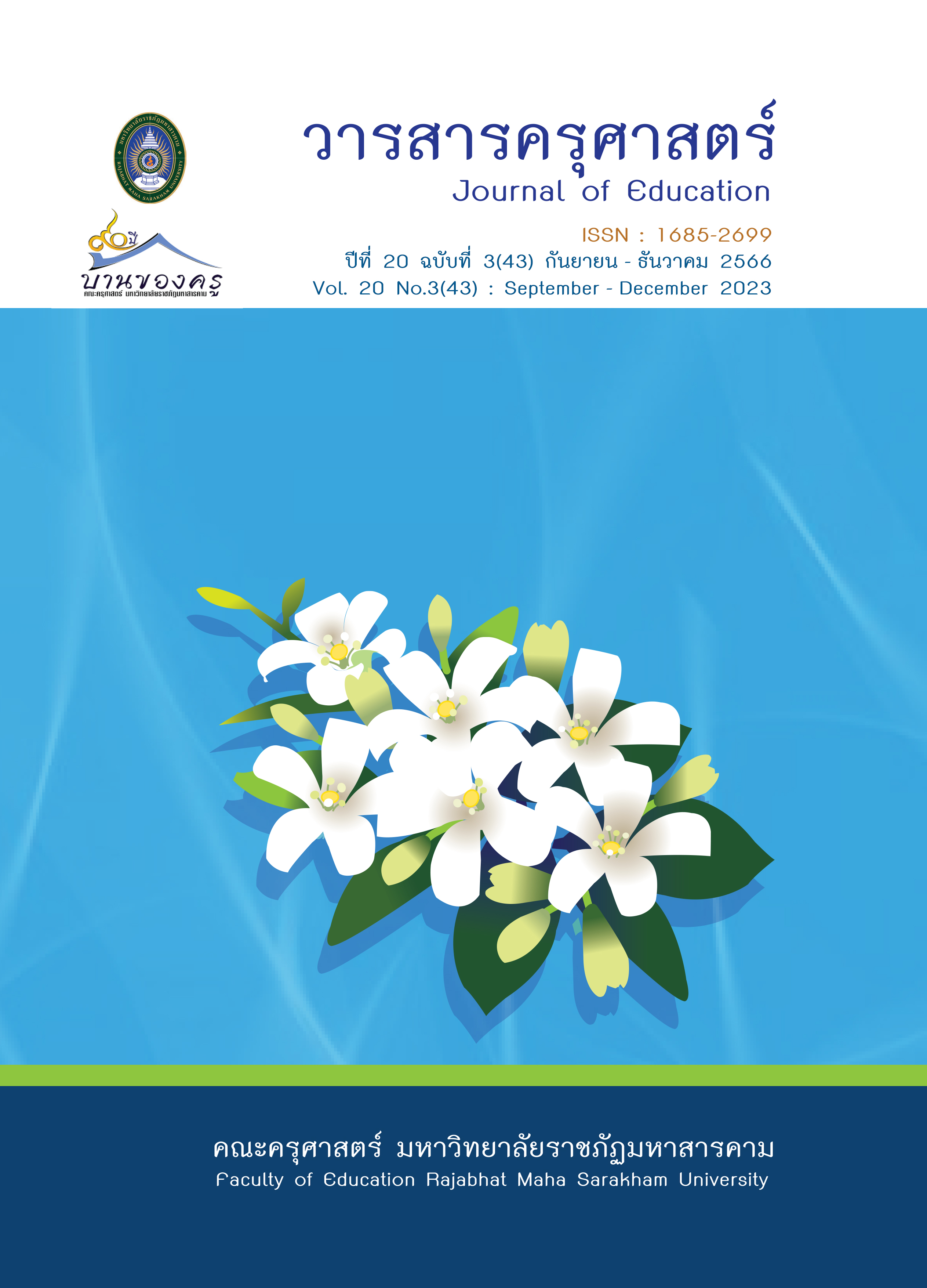Development Critical Thinking and Attitude Toward Social Study Learning of 6th Grade Student Based-on Metacognitive Approach Collaborate with Collaborative Learning
Main Article Content
Abstract
The purposes of this research were: 1) to compare critical thinking of 6th grade student before and after the learning management based on metacognitive approach collaborated with collaborative learning and 2) to compare attitude toward social study learning of 6th grade students before and after the learning management based on metacognitive approach collaborated with collaborative learning. This research conducted experimental investigations with 17 students from a class of grade 6 in Bansansuksamakkee school, Kumtakha District, Sakhonnakhon Province in the second semester of 2022 academic year. The students were obtained by using cluster random sampling method. The research instruments for data collection composed of 15 learning management plans, the 5 items Critical Thinking Assessment Form and the 8 items Attitude Assessment Form. The data analysis statistic consisted of mean, standard deviation and t-test for dependent sample.
The results showed that: 1) the students of the learning management based on metacognitive approach collaborated with collaborative learning had posttest scores of critical thinking higher than before the learning at the .05 level of significance, with pretest score of 8.70 and posttest score of 10.53 and 2) the students of the learning management based on metacognitive approach collaborated with collaborative learning had posttest scores of attitude toward social study learning higher than before the learning at the .05 level of significance, with pretest score of 21.59 and posttest score of 30.24
Article Details

This work is licensed under a Creative Commons Attribution-NonCommercial-NoDerivatives 4.0 International License.
ข้อกำหนดเบื้องต้นที่ผู้นิพนธ์(ผู้ส่งบทความ) ควรทราบ
1. ผู้นิพนธ์ที่ประสงค์จะลงตีพิมพ์บทความกับวารสาร ตั้งแต่เดือนมกราคม 2563 เป็นต้นไป ให้ใช้รูปแบบใหม่ (Template 2563) โดยสามารถดูตัวอย่างได้ที่เมนู GUIDELINES
2. จะตีพิมพ์และเผยแพร่ได้ ต้องผ่านการประเมินจากผู้ทรงคุณวุฒิ (Peer Review)
3. การประเมินบทความโดยผู้ทรงคุณวุฒิ (Peer Review) เป็นแบบ Double Blind
4. การอ้างอิงบทความใช้หลักเกณฑ์ APA (American Psychological Association) คลิก
5. บทความถูกปฏิเสธการตีพิมพ์ ไม่ผ่านการประเมิน ผู้นิพนธ์ขอยกเลิกเองหรือชำระเงินก่อนได้รับการอนุมัติ ทางวารสารไม่มีนโยบายการคืนเงิน
References
กรรัตน์ จุลตามละ. (2560). การพัฒนาผลสัมฤทธิ์ทางการเรียน และเจตคติต่อการเรียนทัศนศิลป์ ของนักเรียนชั้นมัธยมศึกษาปีที่ 3 ด้วยการจัดการเรียนรู้โดยใช้ สมองเป็นฐานประกอบกลุ่มร่วมมือ. [วิทยานิพนธ์ปริญญามหาบัณฑิต] มหาวิทยาลัยมหาสารคาม.
ชนาธิป พรกุล. (2554). การสอนกระบวนการคิดทฤษฎีและการนำไปใช้ (พิมพ์ครั้งที่ 2). วี พริ้ม(1991) จำกัด.
ชนิดา พงศ์นภารักษ์. (2550). การใช้กลวิธีอภิปัญญาผ่านสื่อคอมพิวเตอร์ช่วยสอนภาษาเพื่อเพิ่มพูนความสามารถในการอ่านภาษาอังกฤษ การเขียนสรุปความและการเรียนรู้ด้วยตนเองของนักเรียนระดับก้าวหน้า. มหาวิทยาลัยเชียงใหม่.
ทิศนา แขมมณี. (2554). ศาสตร์การสอน: องค์ความรู้เพื่อการจัดกระบวนการเรียนรู้ที่มีประสิทธิภาพ (พิมพ์ครั้งที่ 14). จุฬาลงกรณ์มหาวิทยาลัย.
บุญใจ ชะเอม. (2551). การพัฒนารูปแบบการสอนโดยใช้ยุทธศาสตร์เมตาคอกนิชั่นในการเรียน แบบร่วมมือเพื่อพัฒนาความสามารถในการแก้โจทย์ปัญหาคณิตศาสตร์. [วิทยานิพนธ์ปริญญามหาบัณฑิต] มหาวิทยาลัยราชภัฏบ้านสมเด็จเจ้าพระยา.
ปาริชาติ จิตรฉ่ำ. (2540). การเรียนแบบร่วมมือเพื่อพัฒนาสัมฤทธิ์ผล เจตคติ และทักษะการทำงานร่วมกันในวิชาสังคมศึกษา ส 504 ของนักเรียนชั้นมัธยมศึกษาปีที่ 5. [วิทยานิพนธ์ปริญญามหาบัณฑิต] มหาวิทยาลัยเกษตรศาสตร์.
เพ็ญลักษณ์ สุภา. (2553). การพัฒนาผลสัมฤทธิ์ทางการเรียนรายวิชาสังคมศึกษาโดยใช้กิจกรรม การสอนแบบร่วมมือกันเรียนรู้ของนักเรียนชั้นมัธยมศึกษาปีที่ 4 โรงเรียนมหาชนะชัย วิทยาคม จังหวัดยโสธร. มหาวิทยาลัยขอนแก่น.
วชิรญา ฐิติภัทรพงศธร. (2551). การพัฒนารูปแบบการสอนโดยใช้ยุทธวิธีเมตาคอกนิชัน เพื่อพัฒนาความสามารถในการแก้ปัญหาของนักเรียนชั้นประถมศึกษาปีที่ 6. [วิทยานิพนธ์ปริญญามหาบัณฑิต] มหาวิทยาลัยราชภัฏบ้านสมเด็จเจ้าพระยา.
อทิติยา สวยรูป. (2556). การศึกษาผลสัมฤทธิ์ทางการเรียนในรายวิชา เทคโนโลยีสารสนเทศ เรื่อง คอมพิวเตอร์เบื้องต้น ของนักเรียนชั้นมัธยมศึกษาปีที่ 1 ด้วยการเรียนการสอนแบบกลุ่มร่วมมือโดยใช้เทคนิค STAD. รายงานการวิจัยในชั้นเรียน. คณะศึกษาศาสตร์ มหาวิทยาลัยเกษตรศาสตร์ วิทยาเขตบางเขน.
อารมณ์ ชอบศิลประกอบ. (2542). ผลของการใช้วิธีการเยนแบบร่วมมือที่ใช้เทคนิคสแตดในการเรียนการสอน เรื่อง หลักธรรมในรายวิชา ส018 พระพุทธศาสนาสำหรับนักเรียนชั้นมัธยมศึกษาปีที่1 โรงเรียนสีกัน (วัฒนานันท์อุปถัมภ์) กรุงเทพมหานคร. [วิทยานิพนธ์ปริญญามหาบัณฑิต] มหาวิทยาลัยสุโขทัยธรรมาธิราช.
Al-halal and Ahmad J. (2001). The Effect of Individualistic Learning and Cooperative Learning Strategies on Elementary Students’ Mathematics Achievement and Use of Social Skills. Dissertation Abstracts International, 62(05), 1697-A; November.
Bibiana, N. and Ibadni, S. (2014). A Study of The Attitude Towards Mathematics in Relation to Achievement of Class XI Students, SHILLONG – MEGHALATA. Journal of Internationnal Academic Research For Mulitidiaciplinary, 2(4), May 2014.
Flavell, J.H. (1997). Metacognition and cognitive monitoring. American Psychologies.
Hock, M. and Mellard, D. (2006). Reading comprehension strategies for adult literacy outcomes. Journal of Adolescent and Adult Literacy, 49(3), 2–10.
Sternberg, R.J. (2003). A Broad View of Intelligence : The Theory of Successful Intelligence. Consulting Psychology Journal : Practice and Research, 55(3), 139–154.
Arnold, R. D., and Wade, J. P. (2015). A definition of systems thinking: A systems approach. Procedia Computer Science, 44, 669–678.
Woolfolk, A. (1990). Educational psychology (11th ed.) Columbus, OH : Pearson/Allyn & Bacon.


